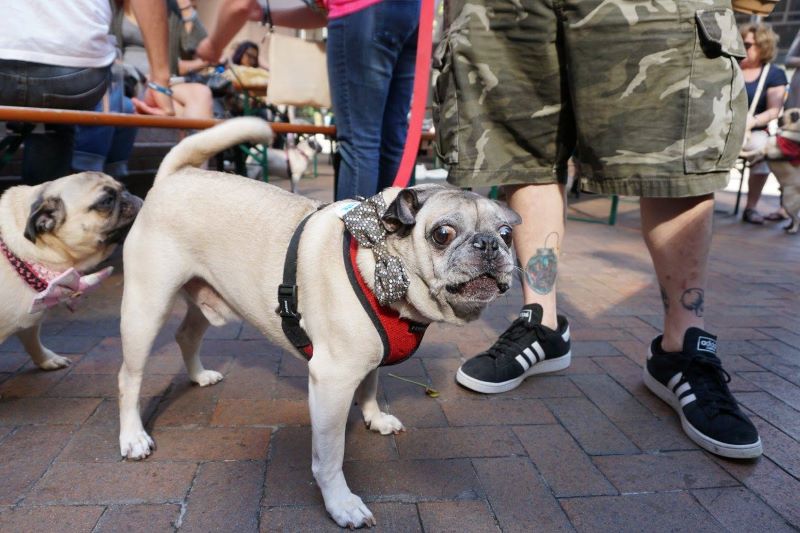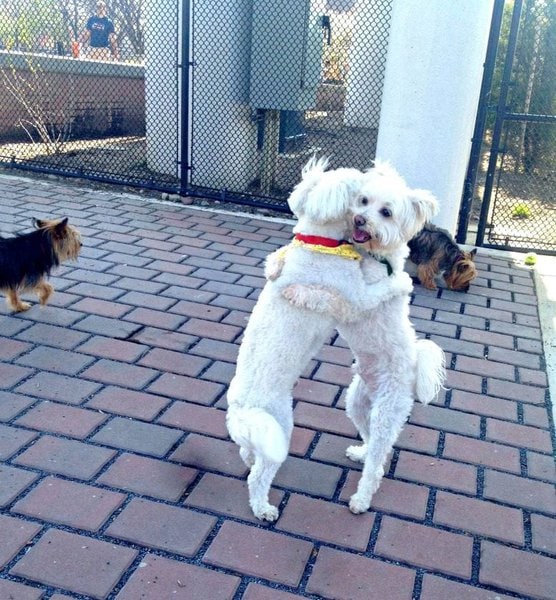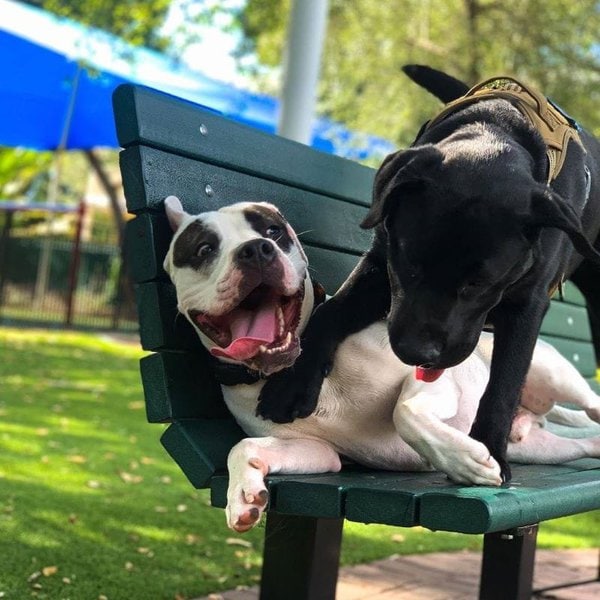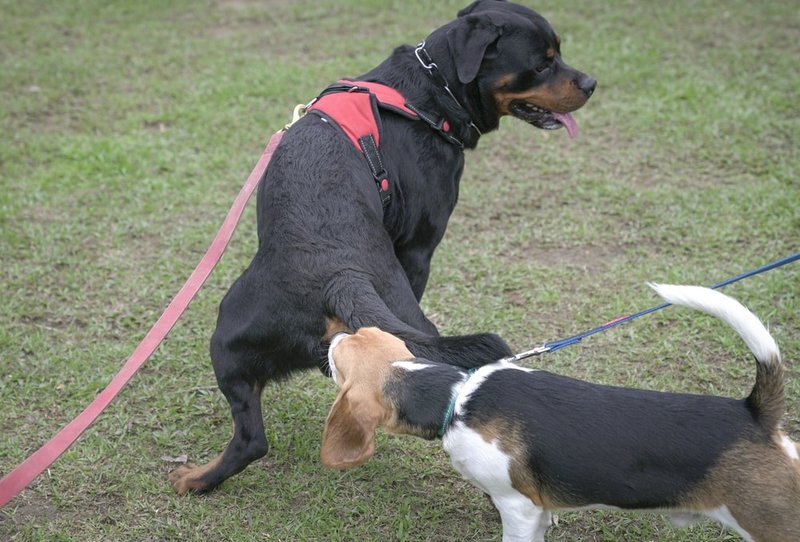Butt sniffing among dogs is an interaction that may seem perplexing to us as humans, but this weird social behavior is of great importance in the canine world.
So, why then do dogs smell each other’s butts? Butt sniffing in dogs is done as a form of greeting or to collect information about each other. Surprisingly, it also serves as a calming mechanism to help agitated pooches.
Before you go ahead to interrupt your pooch the next time you catch it sniffing another pooch’s butt, it is important to note that you might be doing such a pooch more harm than good. Butt sniffing is of great importance to dogs, and the various reasons for butt smelling, as well as a brief breakdown of the canine smell system, are covered extensively in this article.
However, before we go further, let’s see what it is that dogs sniff at, each other’s rear ends, and why it is normal and healthy behavior.
Why Do Dogs Sniff Each Other’s Rear Ends?

Dogs sniff each other’s rear ends, and not any other body part, due to the presence of anal sacs located near the genitals that help with information retrieval.
Dogs have an incredible sense of smell – between 10,000 to 100,000 better than those found in humans! – and by sniffing another pooch’s rear ends, a dog can gather a bunch of information about the pooch that is the interest of its sniffing.
This information includes details about the other dog’s gender, what it has been eating, where it has been and its current temperament.
It is possible for dogs to gather this kind of information by butt sniffing, due to the presence of anal sacs on both sides of a pooch’s genital opening. These anal sacs are usually filled with certain chemicals, and it is these chemicals that dogs sniff at, to gather the required information.
Chemicals that make up the contents of a dog’s anal sacs include trimethylamine and several short chain acids. The scent of these chemicals is so strong that, at any given time, there’s always a bit of the smell floating around a pooch’s posterior region. And dogs, with their super keen sense of smell, are always ready to sniff around and gather information.
How Do Dogs Deal With The Bad Smell?
You may probably be wondering how dogs are able to deal with the repulsive smell of poop when sniffing other dogs’ butts. And it may interest you to know that this is made possible by the presence of a second olfactory system in their noses, known as Jacobson’s organ.
Jacobson’s organ is solely designed to deal with chemical communication, and this organ has its own set of nerves – with the ability to bypass other odors – that lead directly to the dog’s brain.
That said, butt sniffing serves different purposes for dogs, and some of these purposes are outlined in the next section of this article.
What Are The Reasons For Butt Smelling Among Dogs?
Common reasons for butt sniffing in dogs include information gathering, as a form of greeting, and also as a calming mechanism.
To Gather Information About The Other Dog
Top on the list of reasons for butt sniffing among dogs is to gather vital information that will be used to establish the nature of the relationship between both dogs. And as stated earlier, the anal sacs located near a dog’s butt emit certain chemicals that dogs can sniff to obtain relevant information.
By simply sniffing another dog’s butt, a dog can tell:
- Whether the other dog is aggressive or friendly
- If the other dog is nursing a medical condition
- Whether or not the other pooch is ready to mate
- What the other dog has been eating
It is also possible for a dog to limit the amount of information that can be gotten by sniffing its butt, and this is done when the pooch clamps down its tail over its rectum – By doing this, the odor coming out from the pooch’s anal glands is suppressed, and the sniffing dog can only get limited info.
Additionally, not only are our furry friends great sniffers, but they also have an outstanding scent memory, and they can identify old friends and family members just by sniffing their butts.
Dogs that have been separated for a while can catch up by simply sniffing each other’s butts, and this quick exchange can provide a pooch with information on places the other dog has been, as well as what it has eaten.
As A Form Of Greeting

Apart from information gathering purposes, butt sniffing can also be a way for two dogs meeting each other for the first time to greet and establish hierarchy.
Typically, the more dominant dog will initiate the butt sniffing process, while the submissive pooch will either stand or lay still and wait for its turn to smell the other dog’s butt.
As A Calming Mechanism
It may sound irrational, but butt-smelling can be effective at calming down an agitated pooch. Sniffing another pooch’s butts triggers the release of certain calming hormones in a dog’s body, and these hormones help soothe and serve as stress relievers.
What To Do When Your Dog Is Smelling Another Dog’s Butt?
Butt sniffing is a common behavior among dogs; Hence, it is recommended that, if observed, you should leave your dog to continue smelling butts, while monitoring the social interaction between dogs.
Should You Let Your Dog Sniff Other Dogs?
If both dogs are healthy and well socialized, then there is nothing wrong with letting your dog sniff other dogs. Dogs are more likely to get along better with each other if they take time to properly sniff each other’s butts to gather information.

Butt sniffing among dogs is mostly harmless, but regardless, you should be on the lookout for signs of canine aggression, so you can temper the situation before it gets aggravated. There is a tendency for dogs to get over-excited when in groups, and if not controlled, things can get pretty heated really quick, thereby leading to nasty dog fights.
It can also be helpful to train your pooch to obey basic recall commands so that you can quickly contain the situation if your furry friend comes across another pooch that isn’t comfortable with being sniffed.
Get Professional Help When Needed
If you have concerns about how your pooch approaches other dogs to sniff their butts, you can seek the help of an animal behaviorist to help teach your pooch how to contain its enthusiasm, and approach other dogs in a calmer manner.





